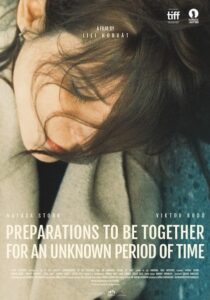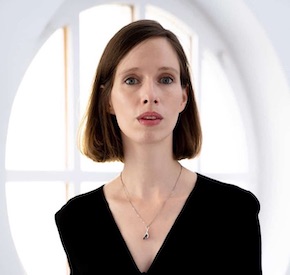Love and madness
by Mark Reynolds
“A spiral staircase, polished to a glossy shine, down which unreliable motivations, self-delusions and romantic obsessions tumble.” Variety
In writer-director Lili Horvát’s second feature, Preparations to Be Together for an Unknown Period of Time, 40-year-old neurosurgeon Márta (Natasa Stork) has made an instant connection with fellow Hungarian surgeon János (Viktor Bodó), who she met at a medical conference in New Jersey. Leaving behind her burgeoning career in the US, she returns to Budapest to start a new life with the man she believes she is in love with. But when she waits for him at the agreed rendezvous, the Liberty Bridge, he doesn’t show up. When she finally tracks him down in a hospital car park, he insists they have never met before. But which of them is telling the truth?
An epigraph from a Sylvia Plath poem in the opening credits prepares viewers for a wondrous exploration of love and madness, fantasy and reality:
“I should have loved a thunderbird instead;
At least when spring comes they roar back again.
I shut my eyes and all the world drops dead.
(I think I made you up inside my head.)”
from ‘Mad Girl’s Love Song’
“I realised that what I wanted to speak about was the enormous role of our own imagination when we are in love,” says Lili, who adds that her creation of Márta was inspired by obsessed female characters such as Heinrich von Kleist’s Käthchen von Heilbronn, Madeleine in Hitchcock’s Vertigo, Truffaut’s Adèle H. and women in the films of Krzysztof Kieślowski. “While sometimes her character is on the brink of madness, everyone who has ever waited in vain on a date, or who has projected something into their love, can feel what she feels.”
The clinical and precise medical setting serves as a counterpoint to the sense of madness. “The lab coat, the mask as an element of disguise, from under which a detail of the private ego of the characters might flash, the ritualistic act of donning and removing these things, all are in play with the essential questions of the film: Who are you? Are you here?” says Lili. “There is also something very mysterious about brain surgery – its almost poetic side – that the doctor is holding a living person’s feelings and thoughts in his/her hands, literally between his/her fingers.”
In her first lead role, Natasa Stork brings a perfect blend of strength and fragility, determination and desperation to her portrayal of Márta, while Viktor Bodó, a renowned theatre director who hadn’t taken an acting role in over a decade, is physically imposing yet inscrutable as János, keeping viewers guessing whether he too harbours an insatiable passion, or is merely a figment of her imagination.
To what extent do we construct love stories within ourselves? How far does our desired reality go, and where does it meet actual reality? How differently can two people experience the same love?”
The setting is Budapest, but because we can’t be sure of Márta’s state of mind, the city itself could be a fantasy, and the cinematography reinforces every shred of uncertainty. Lili has collaborated with DP Róbert Maly since film school, and in their research together on how best to depict what she defines as “the insecurity, the fragility and precariousness of reality”, they came across the work of American photographer Saul Leiter in an exhibition in Vienna. “The mysteriousness hidden in his photos, in their texture, colour, lighting and framing, became our first point of reference,” she says.
Shooting on 35mm became a necessity. “In a technical sense, celluloid is an imperfect raw material,” says Lili. “It will never be perfectly sharp. It is grainy and noisy. Its range and colour depth is narrow. It records fewer frames. Films shot on celluloid have an indispensable need for the viewer’s memories, feelings and thoughts for it to fully flesh out the given story. By activating the viewer’s own fantasies and projections, we can direct their attention to the real terrain of our story, beyond the concrete actions: the narrow borderline between reality and imagined reality.”
“To me,” she concludes, “Preparations… is primarily a personal story about the role of projection in love. Our film plays out in the unsettlingly murky no-man’s-land that separates love from madness. To what extent do we construct love stories within ourselves? How far does our desired reality go, and where does it meet actual reality? How differently can two people experience the same love?”
 Lili Horvát was born in 1982 and grew up in Budapest. She studied audiovisual arts at the Sorbonne Nouvelle in Paris and film directing at the University of Theatre and Film in Budapest. Her first feature The Wednesday Childwon the East of the West competition at the 2015 Karlovy Vary International Film Festival, and received numerous awards worldwide. In 2016, she co-founded the production company Poste Restante. Preparations to Be Together for an Unknown Period of Time, Hungary’s official selection for the 2021 Oscars, won Lili Best Director at the 2021 Dublin International Film Festival. It is released exclusively in the UK on Curzon Home Cinema.
Lili Horvát was born in 1982 and grew up in Budapest. She studied audiovisual arts at the Sorbonne Nouvelle in Paris and film directing at the University of Theatre and Film in Budapest. Her first feature The Wednesday Childwon the East of the West competition at the 2015 Karlovy Vary International Film Festival, and received numerous awards worldwide. In 2016, she co-founded the production company Poste Restante. Preparations to Be Together for an Unknown Period of Time, Hungary’s official selection for the 2021 Oscars, won Lili Best Director at the 2021 Dublin International Film Festival. It is released exclusively in the UK on Curzon Home Cinema.
Watch now
@CurzonCinemas
Mark Reynolds is a freelance editor and writer, and a founding editor of Bookanista.
@bookanista
wearebookanista
bookanista.com/author/mark

